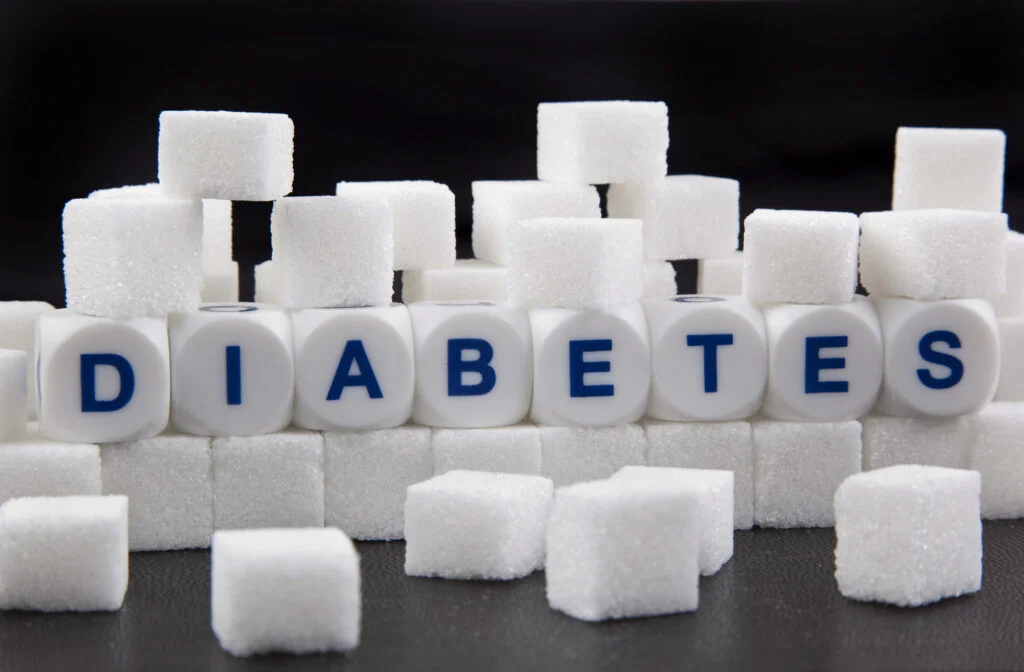Contents
Sugar And Diabetes

Many people get confused that eating sugar can cause diabetes. It is a disease that can cause by high blood sugar levels (hyperglycemia). While it’s true that eating a lot of added sugar raises your risk of diabetes. However, sugar consumption is only one part of this equation. You can also have a variety of other risks factors, including your general diet, lifestyle, and heredity.
More On Sugar And Diabetes
Diabetes has become more prevalent in countries with a lot of food. Obesity, cardiovascular diseases, and other health issues can arise due to excessive sugar consumption. Sugar causes diabetes generally to the people suffering from type 2 diabetes. It generally appears in complicated and uncertain cases. Type 1 and type 2 diabetes both have an impact on the body’s capacity to control blood glucose levels. Type 1 diabetes, on the other hand, is an autoimmune disease in which the body’s immune system attacks insulin-producing cells. Damage to these cells impairs the body’s capacity to regulate blood sugar levels.
On the other hand, overeating and obesity cause the development of type 2 diabetes which can lead to weight gain. When someone has diabetes, eating too much sugar can cause various other complications. It is because diabetes makes it more difficult for the body to control blood sugar levels. People with type 2 diabetes should monitor their sugar consumption.
Sugar’s Role In Diabetes
The research found that sugar is one of the leading causes of diabetes. Some scientists turned their theories to carbs. Some simple and complex carbohydrates show the properties of digestion like sugar. They are easily digested and get mixed with the blood, thereby causing fluctuations in the blood sugar levels. The digestion of certain takes place differently in the body depending on their type. However,
- Simple carbohydrates are easily digested and metabolized. It has a simpler chemical form which helps our body to digests faster.
- Complex carbohydrates take longer to pass through our body system. This results in more consistent blood sugar levels. It also breaks down into molecular forms. This carbohydrate takes a little longer to digest food in our body.
Hence, many dieticians recommend complex carbs for diabetics. Whole-wheat bread, brown rice, legumes like black beans, and quinoa are some good sources of complex carbs. These food items are high in fiber, vitamins, and minerals, making them suitable for any diet and for any type of diabetes. Experts agree that having complex carbohydrates in your daily diet will help you maintain a healthy weight and make you active for a whole day.
Natural Sugars

Diabetes keeps a close connection with the consumption of excessive amounts of added sugars. However, natural sugars are not related to this disease. You can find natural sugars in fruits and vegetables. These natural sugar does not contain any extra added sugar during processing or manufacturing. Natural sugars can be absorbed and digested more slowly. They are less likely to induce blood sugar level spikes. It is so because they contain fiber, water, antioxidants, and other minerals.
Fruits and vegetables also contain significantly less sugar per calorie than many processed foods. This makes it easier to maintain a healthy sugar intake. A peach, for example, contains about 8% sugar by weight, whereas a snickers bar contains 50% sugar by weight. While several studies suggest that eating at least one serving of fruit each day reduces the occurrence of diabetes by 7–13% as compared to not eating any fruit.
Artificial Sweeteners

Artificial sweeteners are sweet-tasting, man-made chemicals that our body is unable to digest for energy. As a result, they give sweetness without adding calories to your diet. It relates to the development of insulin resistance and type 2 diabetes. Some factual data states that artificial sweeteners do not boost blood sugar levels.
Moreover, drinking just one diet soda per day can link to about 25–67% increase in risk factors of type 2 diabetes. There are several theories about the query: why artificial sweeteners raise the risk of diabetes? These types of food items help to stimulate sweet-tasting food cravings which leads to an increase in sugar consumption and weight gain.
However, an increase in sugar consumption and weight gain is one of the diabetes risks factors. According to some research, artificial sweeteners can alter the type and number of bacteria living in your colon. It perhaps contributing to glucose intolerance, weight gain, and diabetes. While it also appears a link between artificial sweeteners and diabetes, yet much research is still needed to fully comprehend the relationship between them.
Food Items Containing Sugar For Diabetics
It is difficult to find the best food items for people living with diabetes. They should know which food contains sugar, especially for people suffering from type 2 diabetes. It is because they need to control their blood sugar level. Higher blood sugar levels can cause higher risks of many diseases such as diabetes. People with diabetes need to avoid the below food items list which contains sugar.

- Sugar-sweetened beverages
- White bread
- Rice
- Pasta
- Trans fat foods
- Fruity flavored yogurt
- Flavored coffee drinks
- Sweetened breakfast cereals
- Honey, agave nectar, and maple syrup
- Dried fruit
- Fruit juice
- French fries
Food Items Without Sugar For Diabetics
Your choice of food matters a lot when you’re a diabetic. Nothing is off-limits totally. Even the “worst” products could be occasional treats if consumed in small quantities. However, they won’t help you with having a lot of nutrition. Hence, sticking to the “best” food items that either do not contain sugar or contain less sugar is the greatest way to control your diabetes.

- Whole grains
- Baked sweet potato
- Fatty fish
- Leafy greens
- Avocados
- Eggs
- Chia seeds
- Beans
- Greek yogurt
- Nuts
- Broccoli
- Extra virgin olive oil
- Flaxseeds
- Apple cider vinegar
- Strawberries
- Garlic
- Squash
- Shirataki noodles
Risk Factors For Diabetes
The link between sugar and diabetes is very clear. It can lead to many health problems such as an increased risk of cardiovascular diseases, strokes, and even fatalities. Moreover, people who consumed more than 25% of their daily calories from sugar are more prone to dying from heart diseases. On the other hand, those who are consuming 10% or fewer calories from sugar are less prone to risks of any heart diseases. That is why it is important to take sugar carefully for diabetics. Some of the risks which includes while eating too much sugar are:
- Liver disease
- High cholesterol
- Hormone changes
- Cancer
- Tooth decay
- Chronic illness
- Weight gain
- Chronic inflammation
- Obesity
These are a few chronic conditions that people with diabetes might undergo if they do not monitor and optimize their blood sugar levels. However, below are other risk factors that are even more complicated for diabetics.
Increase In Body Weight

According to the research, obesity is one of the key risk factors for type 2 diabetes. However, decreasing merely 5–10 percent of one’s body weight can lower the risk of diabetes to a great extent. A person’s chance of having type 2 diabetes increases if they are overweight or obese. In addition, an increase in weight is unable to control blood sugar levels. This makes it difficult for type 2 diabetics to control blood sugar levels. Moreover, insulin resistance is a disease that affects people with type 2 diabetes.
A Lot Of Physical Exercises

Physical exercises are important, but excess of everything is absolutely dangerous. Individuals who are active to a great extent and those who have a sedentary lifestyle have approximately twice the chance of acquiring type 2 diabetes. Just 150 minutes of moderate activity per week can help minimize the risk of diabetes. People need to understand that they should maintain a healthy lifestyle rather than focusing on doing excessive exercise. In general, diabetics are less active. They need to be more active in their daily lifestyle to lower the risks of diabetes.
Excessive Smoking

Smoking more than 20 cigarettes per day can double your risk of diabetes. You can prevent diabetes by quitting smoking or taking fewer cigarettes per day. Smokers with diabetes are more likely than nonsmokers who are experiencing problems with insulin dose and disease management. Smokers who don’t want to get diabetes should avoid smoking in order to lower the risk of diabetes. They should also engage in other activities in which they have their interests. For example, following any hobby like dancing, singing or etc.
Sleep Apnea

Sleep apnea, a disorder in which breathing is blocked during sleeping which causes diabetes risk factors. An increase in stress promotes insulin resistance and also leads to excessive hunger for some people. If left untreated, then it may cause snoring and tiredness for the whole day. Despite the fact that you have a good night’s sleep. This further raises blood sugar levels and causes many heart diseases. Therefore, it is required to treat it on time.
Genetics

If one of your parents has type 2 diabetes, you’re 40 percent more likely to develop it. Also, nearly 70 percent are more likely to develop if both parents have it. This implies a genetic link between you and your parents. Many researchers have link gene mutations with the higher risk of having diabetes. Diabetics generally acquire one or two of these mutations. However, not every people with mutations acquires diabetes.
Prevention For Diabetes
If you want to cut back on sugar then you need to take some preventions which will also help in reducing the risks of diabetes. You can maintain your diet by balancing food and not eating any added sugar food items.
Other Preventive Measures For Diabetes
Here are some measures that you can follow to prevent the complications of diabetes:
- Managing your weight is one of the best ways to prevent diabetes. If a person loses 5-7% of their weight, they can lower the risk of diabetes.
- Getting proper exercise every day for about 150 minutes will helps in regulating blood glucose levels. It will also reduce body weight. However, exercising too much can be dangerous also.
- Controlling your portion of food while adding enough fiber, proteins or other healthful fats also helps in preventing the risk of diabetes. It will regulate or control your blood glucose levels. Moreover, you need not be required to give up on the foods that you wanted to eat. You just need to take those foods in portions.
- Women can control their risk of diabetes by managing their body weight before and after pregnancy. They can also increase their physical activities to balance their weight.
- You may also consult with your doctor for some safe measures regarding weight loss and weight gain.
- Drink alcohol in moderation for about 0.5-3.5 drinks per day. This has been linked with lowering the risks of diabetes by about 30%.
- In your diet, add more leafy green vegetables which help lower the risks by about 14 percent.
- Drinking coffee each day is associated with a 7% lowering risk of diabetes. You may also follow a whole food diet including fruits, vegetables, and whole grains.
Moreover, excessive levels of added sugars are linked to a higher risk of type 2 diabetes. These effects on the liver cause an increased risk of obesity. Unlike natural sugars in fruits and vegetables, artificial sweeteners are more prone to a higher risk of diabetes.
Conclusion
The above article tells you about the relationship between sugar and diabetes. It also explains the causes and the risks factors which lead to diabetes. However, diabetics can follow the prevention that is mentioned above. These precautions will help you in controlling your blood sugar level.
Do you want to get rid of diabetes? Join our online diabetes consultation program and reverse your Diabetes naturally through lifestyle changes such as a Personalized Diet plan, Exercise, dieticians, and health coaches.


